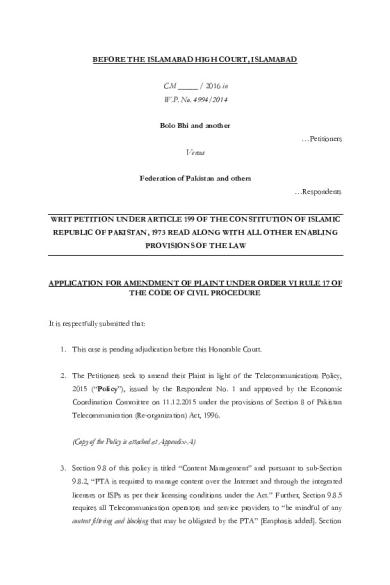Bolo Bhi Application to Amend Plaint PDF

| Title | Bolo Bhi Application to Amend Plaint |
|---|---|
| Course | LLB |
| Institution | University of Calicut |
| Pages | 2 |
| File Size | 99.3 KB |
| File Type | |
| Total Downloads | 102 |
| Total Views | 151 |
Summary
The Information Technology Act, 2000 (also known as ITA-2000, or the IT Act) is an Act of the Indian Parliament (No 21 of 2000) notified on 17 October 2000. It is the primary law in India dealing with cybercrime and electronic commerce....
Description
BEFORE THE ISLAMABAD HIGH COURT, ISLAMABAD C.M _____ / 2016 in W.P. No. 4994/2014 Bolo Bhi and another …Petitioners Versus Federation of Pakistan and others …Respondents
WRIT PETITION UNDER ARTICLE 199 OF THE CONSTITUTION OF ISLAMIC REPUBLIC OF PAKISTAN, 1973 READ ALONG WITH ALL OTHER ENABLING PROVISIONS OF THE LAW
APPLICATION FOR AMENDMENT OF PLAINT UNDER ORDER VI RULE 17 OF THE CODE OF CIVIL PROCEDURE
It is respectfully submitted that: 1. This case is pending adjudication before this Honorable Court. 2. The Petitioners seek to amend their Plaint in light of the Telecommunications Policy, 2015 (“Policy”), issued by the Respondent No. 1 and approved by the Economic Coordination Committee on 11.12.2015 under the provisions of Section 8 of Pakistan Telecommunication (Re-organization) Act, 1996. (Copy of the Policy is attached at Appendix-A) 3. Section 9.8 of this policy is titled “Content Management” and pursuant to sub-Section 9.8.2, “PTA is required to manage content over the Internet and through the integrated licenses or ISPs as per their licensing conditions under the Act.” Further, Section 9.8.5 requires all Telecommunication operators and service providers to “be mindful of any content filtering and blocking that may be obligated by the PTA” [Emphasis added]. Section
4. The Petitioner's main contention in the instant Petition is that the Respondent No. 1 lacks legal authority to block content and assume the role of regulator as there exists no law enabling any federal or provincial authority to regulate, block, or censor content on the Internet. 5. According to the settled legal principles of delegation of authority, only that power or authority may be delegated which the delegator itself possesses. Since the Respondent No. 1 lacks the legal authority to block and censor content, it cannot authorize the Respondent No. 3 to do the same, as Respondent No. 3 is not otherwise so authorized under provisions of Pakistan Telecommunication (Re-organization) Act, 1996. 6. As the matter is currently sub judice, this honorable Court has the authority to take cognizance of events relating to the subject matter of the Petition that transpire during the pendency of this Petition under the doctrine of lis pendens. 7. Authorization granted to the Respondent No. 3 under Section 9.8.5 of the Policy is ultra vires the powers of Respondent No. 1 under Pakistan Telecommunication (Reorganization) Act, 1996 and the Constitution of Pakistan, 1973. Further, it is a direct breach of the interim injunctive order passed by this Court and is a clear attempt by Respondents No. 1 and 3 to circumvent the operation of the said order. PRAYER: In light of the above, it is humbly prayed that this Honorable Court may allow the Petitioners to amend their Prayer in the afore-titled petition to add an additional Prayer Clause, without prejudice to the Prayer already requested for in the Petition, as follows: “Declare that Section 9.8 of the Impugned Policy is ultra vires the Constitution and the Telecom Act.”
On behalf of Petitioner Through
Babar Sattar (Advocate High Court)...
Similar Free PDFs

Plaint With Summons
- 2 Pages

Sample Plaint and Written Statements
- 20 Pages

Application Assignment
- 2 Pages

Application-development
- 17 Pages

Paris application
- 2 Pages

Application Software
- 6 Pages

Volunteer-Application
- 2 Pages

Application & Conclusion
- 1 Pages

Application Letter
- 2 Pages

Bail Application
- 4 Pages
Popular Institutions
- Tinajero National High School - Annex
- Politeknik Caltex Riau
- Yokohama City University
- SGT University
- University of Al-Qadisiyah
- Divine Word College of Vigan
- Techniek College Rotterdam
- Universidade de Santiago
- Universiti Teknologi MARA Cawangan Johor Kampus Pasir Gudang
- Poltekkes Kemenkes Yogyakarta
- Baguio City National High School
- Colegio san marcos
- preparatoria uno
- Centro de Bachillerato Tecnológico Industrial y de Servicios No. 107
- Dalian Maritime University
- Quang Trung Secondary School
- Colegio Tecnológico en Informática
- Corporación Regional de Educación Superior
- Grupo CEDVA
- Dar Al Uloom University
- Centro de Estudios Preuniversitarios de la Universidad Nacional de Ingeniería
- 上智大学
- Aakash International School, Nuna Majara
- San Felipe Neri Catholic School
- Kang Chiao International School - New Taipei City
- Misamis Occidental National High School
- Institución Educativa Escuela Normal Juan Ladrilleros
- Kolehiyo ng Pantukan
- Batanes State College
- Instituto Continental
- Sekolah Menengah Kejuruan Kesehatan Kaltara (Tarakan)
- Colegio de La Inmaculada Concepcion - Cebu





